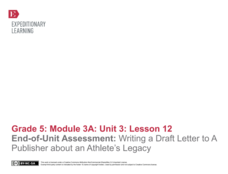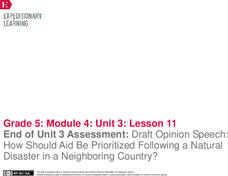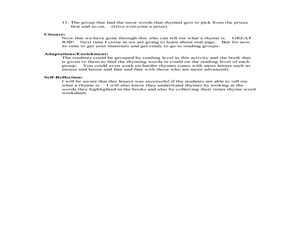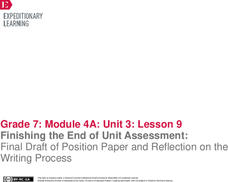ReadWriteThink
Word Recognition Strategies Using Nursery Rhymes
As a class, scholars read the poems, Humpty Dumpty, Peter, Peter, Pumpkin Eater, and Jack and Jill, in order to identify words with the same ending sound. Using their rhyming skills, learners brainstorm additional words...
Syracuse City School District
Greek and Latin Roots, Prefixes, and Suffixes
How can adding a prefix or suffix to a root word create an entirely new word? Study a packet of resources that focuses on Greek and Latin roots, as well as different prefixes and suffixes that learners can use for easy reference.
Curated OER
The Beginning, The Middle, & The End
Cut magazine pictures into three sections, having your youngsters piece the pictures back together. With this fun activity, they discover the importance of sequencing a story. Then they use a fun template (shaped like a burger) to write...
Curated OER
So Much Depends Upon...Sixteen-Word Imagery Poems Inspired by Love that Dog by Sharon Creech
After reading Love That Dog by Sharon Creech (and possibly shedding a few tears), middle schoolers work on their own sixteen-word poems with a Six Trait writing activity. They focus on word choice in this activity to capture an...
EngageNY
End-of-Unit Assessment: Writing a Draft Letter to A Publisher about an Athlete’s Legacy
Serving as the end-of-unit assessment, scholars draft letters to a publisher about an athlete's legacy. They then reflect on their progress by completing a self-assessment.
Florida Center for Reading Research
Multiple Meaning Words in Context
Multiple meaning words is the focus of a lesson designed to reinforce the use of context clues. Scholars listen carefully to a variety of sentences using the words pool and cast to decide which definition best fits the...
EngageNY
Revising for Organization and Style: Exciting Endings
Young writers compose a gripping ending to their historical fiction narratives. Following the previous lesson plan, where learners wrote a bold beginning, class members examine exciting endings from a literary text. They then draft their...
Meadows Center for Preventing Educational Risk, University of Texas at Austin
Lesson 12 - Ed Suffix with Unchanging Base Words
Understanding different verb tenses begins with knowing how to decode words. A lesson on the -ed suffix with unchanging base words introduces readers to the past tense. Teachers present the skill with oral reading and spelling...
EngageNY
End of Unit 3 Assessment: Draft Opinion Speech: How Should Aid Be Prioritized Following a Natural Disaster in a Neighboring Country?
Put it to the test. With the cumulative resource, pupils complete the End of Unit 3 Assessment. Using everything they've learned in the unit, they write a draft of an opinion speech about how to prioritize aid after a natural...
Curated OER
Highway of Words
The punctuation police are here! Dress up as a police officer, and teach your young learners the importance of using correct punctuation. Two poorly written paragraphs are presented to the learners, and they have to correct the errors in...
Curated OER
Word Center
Construct spelling words through a Making Words activity. Learners create words at various levels using onsets, rimes, suffixes, long and short vowels, and word families. They write words as they create them and compare the words with...
Curated OER
Irregular Word Accuracy, Word Relay Race!
Ready, set, go! Practice irregular words by playing a relay race game. Start by dividing your class into two teams of four or five kids. They line up in front of their team's bucket of words and pick out a word from the bucket and...
EngageNY
End of Unit Assessment, Part 1: On-Demand Essay “What Makes A Hurricane A Natural Disaster?”
It's time to refine writing and word choice. Learners work on Part 1 of their end of unit assessment by creating an essay titled What Makes a Hurricane a Natural Disaster? They use glossaries and graphic organizers from previous...
Curated OER
Novel Study: The End of the Line
The End of the Line, Angela Cerrito's gripping novel about an adolescent murderer incarcerated in an unusual "school," is the subject of a comprehensive set of support materials. Chapter vocabulary and discussion questions are excerpted...
EngageNY
End of Unit Assessment, Part II: Storyboard Draft, Sections 2 and 3
It's time to demonstrate knowledge. With the instructive resource, pupils complete the second part of the end of unit assessment. They develop sections two and three of their storyboards about an invention, add visual elements, and then...
University of California
The End of the Cold War (1979-1991)
Scholars use primary and secondary documents, as well as video evidence, to investigate the end of the Cold War. After completing the final installment of an eight-part series, class members better understand the issues surrounding...
EngageNY
End of Unit 2 Assessment: A Hosted Gallery Walk
Speak your mind. Scholars present their claims in groups of three. They use a presentation checklist as each member takes a turn. At the end of the lesson plan, pupils complete an End of Unit 2 Assessment: Presenting a Claim and Findings...
Curated OER
The Wonderful Pigs of Jillian Jiggs: Rhyming Words
Readers explore rhyming words. They will use the story The Wonderful Pigs of Jillian Jiggs to identify rhyming words. Then they will create their own lists of rhyming words. In the end, they will be able to come up with words that rhyme...
EngageNY
End of Unit Assessment: Fishbowl Discussion
Is it worth it? Scholars complete the end of unit assessment by participating in a fishbowl discussion to consider if the benefits of DDT outweigh the consequences. They reflect on their discussions by completing an exit ticket.
EngageNY
End of Unit Assessment: Final Draft of Hero’s Journey Narrative
All journeys must come to an end. Using the final lesson in the series, pupils analyze a model narrative for use of transitional words and phrases. Next, they apply their learning to their final drafts of their hero's journey...
EngageNY
End of Unit Assessment: Text to Film Comparison
Scholars work on an end-of-unit assessment to put all of their learning together. They complete short answer questions about gist, multiple choice questions about A Midsummer Night's Dream, and complete graphic organizers comparing film...
EngageNY
End of Unit Assessment: Claims, Interactions, and Structure in “Is Money Affecting Your Social Status?”
It's not about the money. Scholars use the text Is Money Affecting Your Social Status? to complete their end-of-unit assessments. After finishing the assessment, they discuss how the text relates to their working definition of identity...
EngageNY
Finishing the End of Unit Assessment: Final Draft of Position Paper and Reflection on the Writing Process
Think about it. Writers think about their end of unit essays through reflection. They use the End of Unit 3 Assessment, Part 2: Reflection on the Writing Process handout to analyze the writing process they used to create their...
EngageNY
End of Unit 1 Assessment: Analyzing an Interview with a Rainforest Scientist Part 2 and Comparing and Contrasting Texts About Rainforest Biodiversity
The end is in sight. Pupils complete an end of unit assessment, analyzing an interview with a rainforest scientist and then comparing and contrasting two informational texts. Next, they complete a self-assessment to reflect on their...























